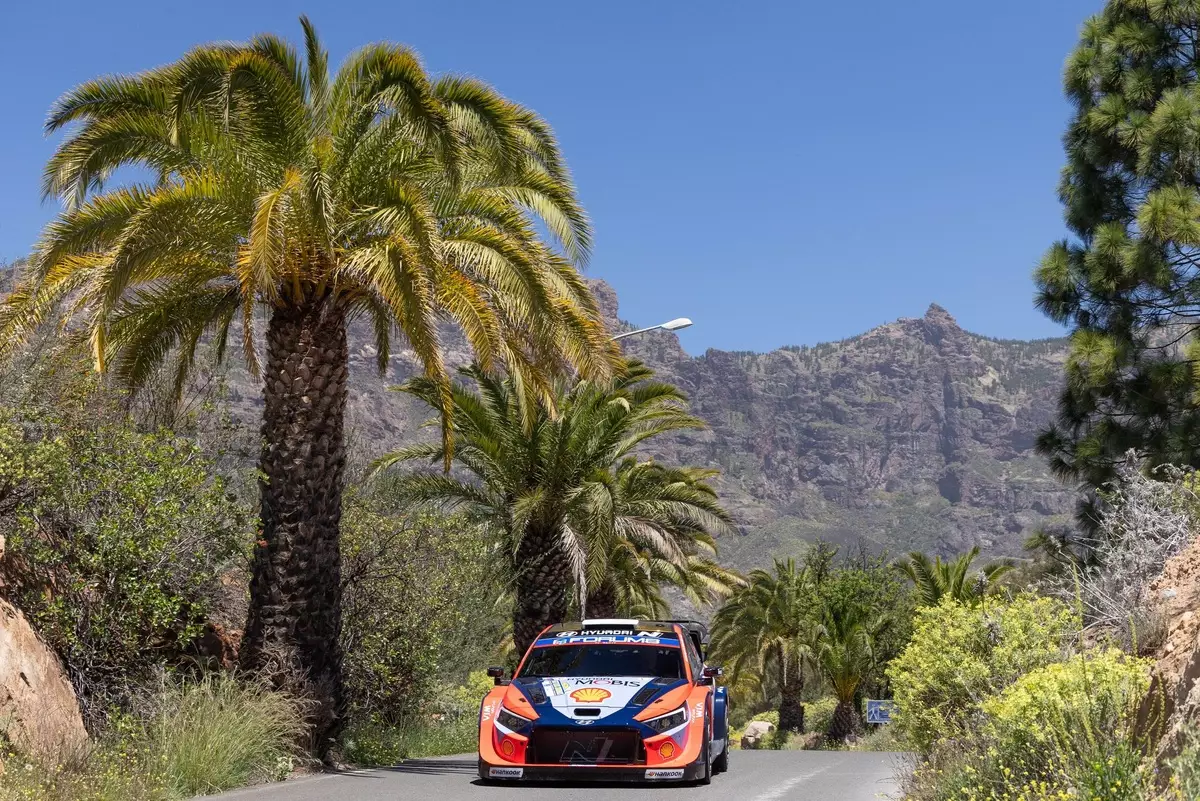The harsh reality of competitive racing often reveals itself in unexpected ways. Hyundai’s performance at the Rally Islas Canarias epitomizes this, illustrating a stark disconnect between expectations and reality. Ott Tanak’s sentiment that Hyundai was “clearly unprepared” for the first pure asphalt event of the 2025 World Rally Championship season sheds light on a critical miscalculation. While the team entered the rally buoyed by Thierry Neuville’s promising finish at the previous Rally Sierra Morena, their lack of readiness exposed fundamental flaws in their strategic approach.
Hyundai’s struggle against a seemingly invincible Toyota team, which dominated the event with a remarkable 1-2-3-4 finish, highlights a significant gap in preparation and execution. Expectations may have been set high, yet the outcome revealed a sobering truth: that confidence alone does not guarantee success. The inability to maximize the potential of their Hankook hard compound tires and the issues with car setup became palpable hurdles that Hyundai could not overcome during the rally.
Technical Challenges Revealed
One of the most pivotal revelations from the rally was the technical challenges that Hyundai faced, mainly related to their upgraded i20 N Rally1 car. The sealed components and the team’s inability to reverse the pre-event differential choices proved detrimental. This incident serves as a sobering reminder that even established teams must continuously learn and adapt if they hope to stay competitive.
Adrien Fourmaux’s contrasting performance, finishing as the fastest Hyundai despite his own team’s struggles, could be seen as a bittersweet victory. This recognition of his speed amid a broader team setback hints at untapped potential within the Hyundai ranks. Yet the fundamental issues that prevailed at the Canarias will necessitate a major overhaul to keep pace with rival manufacturers, particularly the formidable Toyota.
Lessons for Future Events
Hyundai’s candid acknowledgment of its shortcomings during the rally signals a critical evolution in their mentality. Tanak’s reflections indicate a recognition that the technical underpinnings of their vehicle were not only flawed but that rectifying these issues would require more than just superficial adjustments. The rally transformed from a competitive showdown to a learning exercise, a strategic pivot to glean insights that could inform future performance.
However, what remains concerning is the depth of the issues faced. Can Hyundai leverage their single homologation joker to effect meaningful changes? The clock is ticking as they prepare for subsequent events in the season. The team’s transparency about the need for improvement is a vital element in sports, as it enables them to address the root causes of their challenges rather than merely applying band-aid solutions.
A Team on the Rise
Despite the frustrations expressed by drivers like Fourmaux, there is a silver lining to the cloud hanging over Hyundai. Automotive engineering is as much about great failures as it is about triumphs. Fourmaux’s optimistic outlook that Hyundai will rebound from this experience showcases a culture of resilience and innovation forged in the heat of competition. His belief that the rally-specific problems will not resurface in future asphalt events offers a glimmer of hope, reinforcing the notion that setbacks can catalyze greater performance improvements.
Hyundai’s commitment to overcoming adversity underscores a vital characteristic of successful teams: the ability to learn and evolve. With the Central European Rally looming in the distance, the lessons learned from the Canary Islands will be crucial in determining their approach going forward. Adaptability, fortitude, and the willingness to confront uncomfortable truths are all essential elements that could redefine Hyundai’s standing in the championship.
The Road Ahead
As the rally season progresses, Hyundai has the potential to harness the insights gained from their experience in the Canary Islands. While the margins for success in the WRC are paper-thin, the ability to push through challenges and refine their approach will be key for the Korean manufacturer. The resolve to attain competitive edge remains strong, framing their participation in the championship as not just about placing but competing fiercely against the best.
Hyundai’s rallying journey is far from over, and the trials faced in the Canary Islands may lay the groundwork for a stronger comeback. In motorsport, resilience shapes the story of teams as they navigate both triumphs and trials. With renewed focus and strategic adjustments, Hyundai aims to convert lessons into success and demonstrate that they are a force to be reckoned with in the World Rally Championship.

